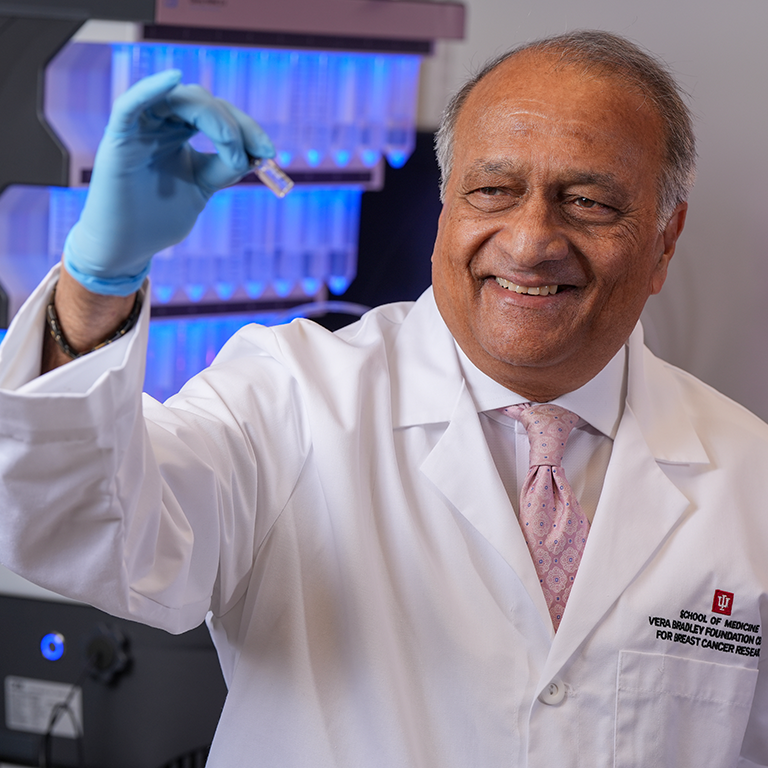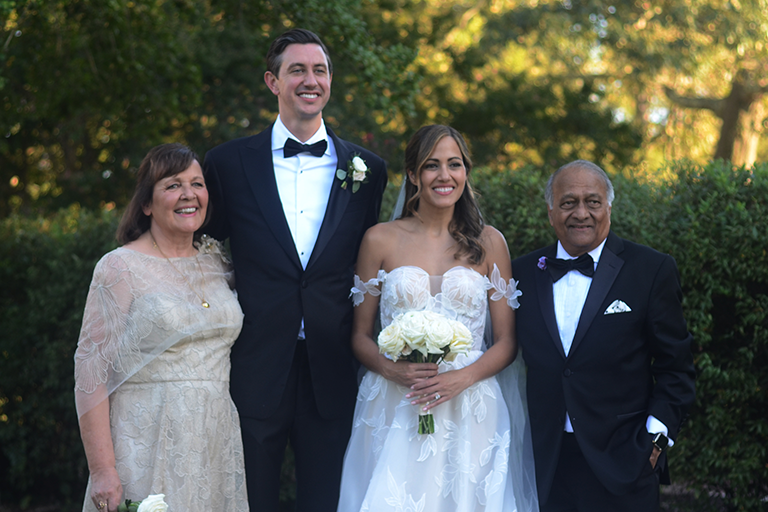By Cindy Dashnaw Jackson
February 01, 2024
Q&A with Pravin Kaumaya, PhD

Pravin Kaumaya, PhD, is in his new role as the Vera Bradley Foundation Professor of Breast Cancer Innovation and director of the Immuno-Oncology and Vaccine Immunotherapy laboratory at the Brown Center for Immunotherapy, and a member of the Experimental and Development Therapeutics (EDT) and the Hematopoiesis and Hematologic Malignancies (HHM) research programs at the IU Simon Comprehensive Cancer Center.
Read the announcement
Kaumaya is also a professor of microbiology and immunology at IU School of Medicine. He answers questions about what brought him to Indianapolis, what he’s most looking forward to and more.
Q. What attracted you to the IU Simon Comprehensive Cancer Center?
Cancer Center Director Dr. Kelvin Lee was instrumental in bringing the revolutionary vaccine CIMAvax from Cuba to the United States when he was at Roswell Park Comprehensive Cancer Center. His visionary leadership, as well as Huda Salman, MD, PhD, the director of the Brown Center, and Mark Kaplan, PhD, the chair of microbiology and immunology, were instrumental in convincing me that the cancer center would be an inspiring place for me to further my own vision of cancer immunotherapy.
Q. Is it correct to say you are a researcher who focuses on creating vaccines for treating a range of cancers? Can you briefly break down what you do?
We conduct translational research from bench to the clinic with the goal of designing and developing new combination immunotherapies and immunologic strategies for cancer treatment and prevention. Our present and future focus is to continue the crucial process of validating the activation of additional immune checkpoint inhibitors for both immunotherapies and autoimmunity as well as developing combination immunotherapeutic strategies.
We are developing novel efficacious peptide vaccines, which have less toxicity than other cancer treatments. I began to develop vaccines for HER-2, a mutated gene overexpressed in breast cancer, then conducted an NIH/NCI-funded Phase I trial followed by an FDA-approved Phase II trial in which we successfully translated two HER-2 combination B-cell peptide vaccines in patients with metastatic and recurrent solid tumors. We developed an effective novel vaccine and have since developed other vaccines and their combinations that might be used in various cancers.
Q. Which of your many research discoveries are you most proud of, and why?
B-cell epitope peptide cancer vaccines: a new paradigm for combination immunotherapies with novel checkpoint peptide vaccine is what I am most proud of. We are creating new cancer therapies with innovative, peptide-based B-cell epitopes and peptide immunotherapeutics targeting multiple types of solid tumors. Our recent work in the field of immuno-oncology is developing vaccines for several checkpoint inhibitors. Our PD-1 vaccine (PD1-Vaxx) successfully completed a Phase I clinical trial and is now enrolling patients with a combination of our PD1-Vaxx and ROCHE’s drug atezolizumab (TECENTRIQ®).
Q: What projects are you most looking forward to working on at the cancer center?
I am excited about the prospects of expanding our Phase I HER-2 clinical trial in a neoadjuvant setting in breast cancer patients with Kathy Miller, MD serving as the clinical principal investigator. In addition to that trial, we are planning to conduct a combination trial with our HER-2 vaccine and PD-1 vaccine in HER-2+ cancer patients (breast and colon/GIST). We will be developing additional checkpoint inhibitor vaccines based on T cell immunoreceptor with immunoglobulin and ITIM domain (TIGIT) [regulators of T cell function and cancer cell recognition], which is a promising new target for cancer immunotherapy. A combination of TIGIT-Vaxx and PDL1-Vaxx will be tested for triple negative breast cancer. Dual PD-1 and TIGIT blockade is a promising combinatorial immunotherapy of cancer that we will explore in the near future.
Q. What kind of working environment is ideal for you, and have you found that at the cancer center?
A cooperative environment and an openness to other ideas are at the spirit of innovation. I have found many scientists at the cancer center with the spirit of cooperation and have already established many collaborations. The possibilities of translating our basic inventions to the clinic with physician-scientists will be a major focus of our future endeavors, and I am excited at such prospects.
Q. What are the biggest questions in cancer research that keep you up at night?
Current targeted therapies face many obstacles in the clinic. These include the rapid development of resistance, high toxicity rates, on- or off-target effects and weak efficacy. The promise of peptides will invigorate drug innovation and discovery and challenge the ingenuity of researchers to develop cancer cures and future therapies that are safe and non-toxic. Our novel targeted immunotherapy approach overcomes these obstacles and holds the promise of making a major leap in the clinical treatment of cancer.
Q. Where will we be in the next five years in cancer prevention?
We will have strategies to enhance and prolong survival and to potentially cure cancer by activating and optimizing the immune system to combat cancer with novel combination immunotherapies and understanding the tumor microenvironment to design better and safer medicines delivered through vaccination.
Q. What has surprised you about your experiences as a cancer researcher?
The resilience of cancer patients and their inventiveness in seeking a better outcome in view of their diagnosis.

Q. You were born on a 2,000-square-kilometer island, Mauritius. How did you get from there to here?
My entire family was educated in England. My dad was educated at the University of London, England. He was a mathematician and an educationalist and founded the University College in Mauritius in the 1950s. He was proud of me obtaining my PhD in 1981. My dad specifically said to me on my departure from London to the United States in 1981 that the U.S. is the best country for you to follow your dreams.
Q. What do you like to do in your spare time?
I used to play soccer, and I coached my daughter and her traveling team. Now I watch soccer, in particular the English Premier League, as my team is Manchester United. I also watch the Euro and World Cup qualifiers and sometimes the MLS (Major League Soccer).
About the Author
Cindy Dashnaw Jackson finds and tells nonprofit stories that inspire audiences to share, show up and support. She honed her ability to craft a message that fits an audience during 20 years in nonprofit PR and communications. Now a freelancer and founder of Cause Communications LLC, she's a copywriter and storyteller for nonprofits across the United States. And she earned her degree at IUPUI.




